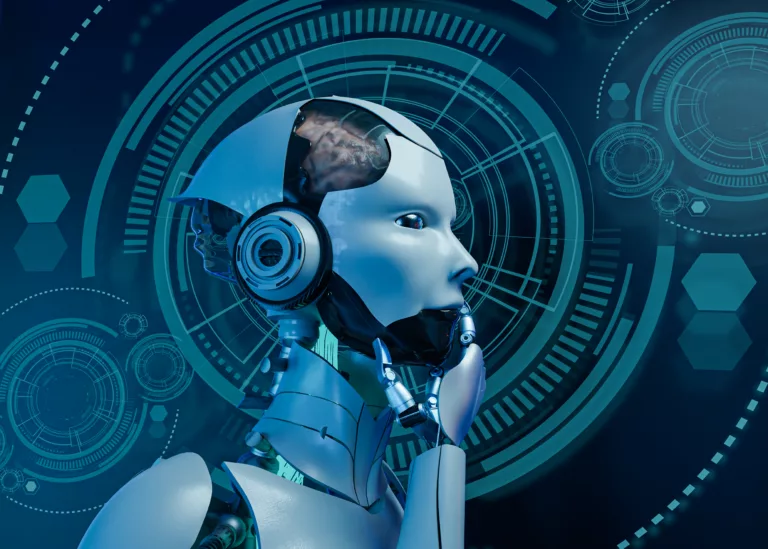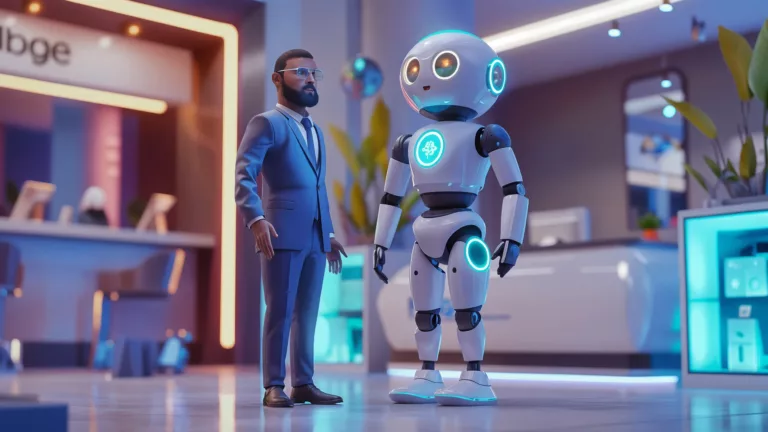
Artificial intelligence, also known as AI, is currently at the heart of discussions about the future of humanity. It is increasingly present in our daily lives, with 77% of the devices we use incorporating some form of AI, whether through virtual assistants like Siri, autonomous vehicles, or systems used in finance and healthcare. A recent study from PwC’s ‘Annual Global CEO Survey’ estimated that artificial intelligence could add $15.7 trillion to the global economy by 2030. This growth would be driven by productivity gains and the increasing consumer demand for products and services optimized through AI. While this technological revolution promises considerable benefits, it also raises serious concerns. The impact on employment, security, and privacy fuels the debate. So, is artificial intelligence an invaluable progress or an imminent threat to humanity?
I - AI, a technological revolution for humanity
Artificial Intelligence (AI) is a branch of computer science dedicated to creating systems capable of mimicking certain human skills. Nowadays, AI is a valuable asset that facilitates many professions. For example, generative AIs, like ChatGPT, are particularly effective for brainstorming. They can generate ideas, ask questions to challenge your thinking, identify weaknesses in a strategy, and assist with writing, summarizing, and instant translation.
In healthcare, tools like IBM Watson Health and Google DeepMind help doctors by enabling faster and more accurate diagnoses. They analyze thousands of medical scans in seconds, facilitating the detection of diseases such as cancer or heart problems. In industry and services, AIs like UiPath and Blue Prism automate repetitive tasks, reducing human errors and increasing productivity. Platforms like Amazon Web Services (AWS) also help businesses understand their customers’ needs through the analysis of large datasets.
In the transportation sector, technologies like Tesla Autopilot and Waymo are transforming the way we drive by developing autonomous vehicles capable of moving without human intervention. Moreover, in scientific research, AIs like DeepMind’s AlphaFold enable major advances in biology, while IBM Watson and Google AI analyze vast datasets in climatology and astronomy.
Thus, AI simplifies our daily lives and saves us time. However, while this is an advantage for some, others perceive artificial intelligence as a threat.
II - AI, a threat to humanity?
Artificial intelligence (AI) provokes both fascination and concern. But why this fear of this technology?
First, the increasing automation threatens jobs in many sectors. Intelligent machines are already replacing workers in areas such as industry, transportation, and financial services. Although AI can create new jobs, many fear it will exacerbate inequalities between skilled and unskilled workers. Furthermore, this distrust is fueled by privacy concerns. In the public’s mind, AI is often associated with sci-fi narratives where machines take control of humans, leading to a fear of being outpaced by this technology. It’s important to note that this fear pertains more to specific AI-based tools rather than AI as a whole.
For example, AI produces both creative content and misleading elements, such as deepfakes—perfectly fabricated videos. This facilitates misinformation, blackmail, defamation, and even political manipulation. Cybercrime is rapidly evolving, posing a growing threat to the security of personal and financial data, making public trust in information sources increasingly difficult.
To alleviate these concerns and secure our future, it is crucial to establish appropriate regulations and promote ethical and responsible use of AI. Raising public awareness of the issues surrounding these technologies is imperative, and it is best to act now.
III - Can artificial intelligence replace humans?

So, can we really assert that humans will be replaced by machines with the current capabilities of AI? Despite the impressive advancements that artificial intelligence (AI) offers, it cannot replace humans for several fundamental reasons.
First of all, emotions and empathy. Humans have the ability to feel and express emotions, which allows them to understand and connect with others in a way that AI cannot. While AI can imitate emotional responses, it does not actually feel these emotions. For example, a chatbot may simulate an empathetic conversation, but it does not truly understand what it means to be sad or happy. Furthermore, human interactions rely on complex elements such as shared experiences, nuances in body language, facial expressions, and tone of voice. During a face-to-face conversation, aspects like eye contact, gestures, and body posture enrich exchanges. These micro-interactions are essential for establishing genuine connections and cannot be replicated by a machine.
Additionally, each human brings their story, experiences, and culture to every interaction. These elements influence our perception of others and our reactions. In contrast, AI operates based on algorithms and data, meaning it lacks this personal and subjective dimension.
Finally, even if AI can perform certain tasks with speed and accuracy, it remains a tool designed to assist humans, not to replace them. For instance, AI systems can help doctors analyze medical exams, but it is always the doctors who make the final decisions regarding patient care. Therefore, AI complements human skills but cannot replace the very essence of what makes us human.
In summary, artificial intelligence represents both an opportunity and a challenge for humanity. When well-managed, AI has the potential to solve some of the world’s greatest problems and significantly improve our quality of life. However, if not regulated, AI could also lead to inequalities, threaten our individual freedoms, and in the worst-case scenario, become an existential threat to our species. Thus, the question is not simply whether AI is a danger or a progress, but rather how we, as a society, will choose to develop and use it. The decisions we make today will have a significant impact on the future of AI and, consequently, on the world we live in.
Feel free to share this article with your loved ones and subscribe to our blog to stay updated on the latest technological trends.







